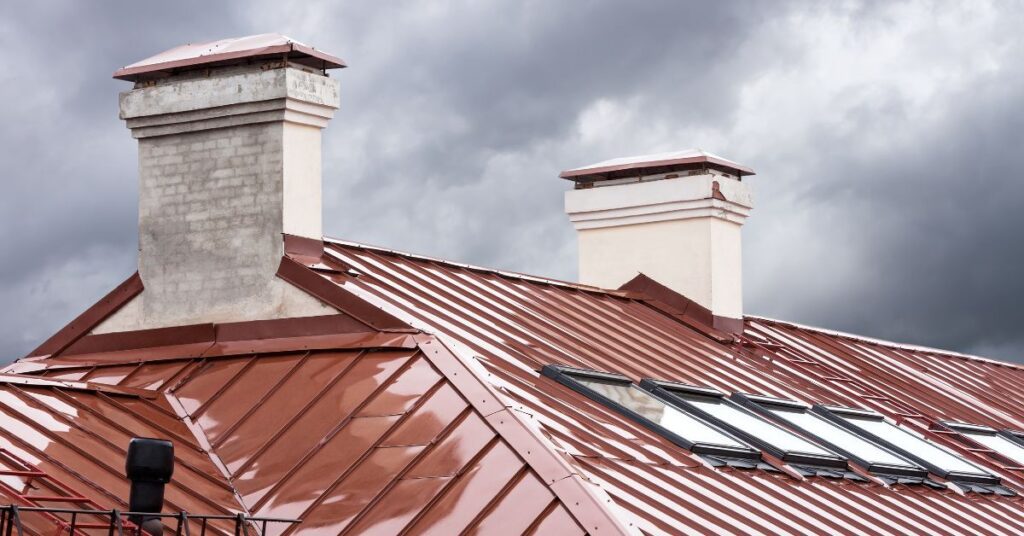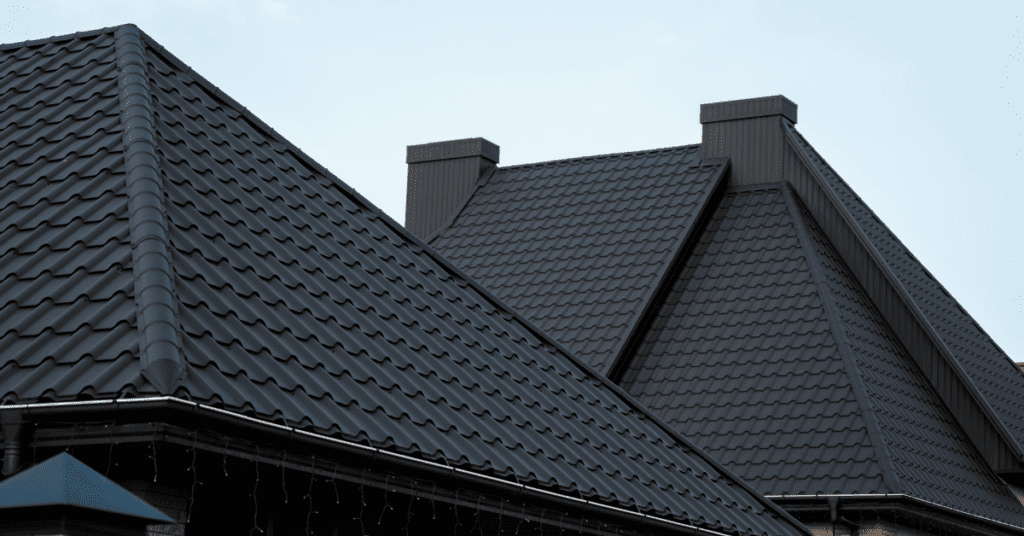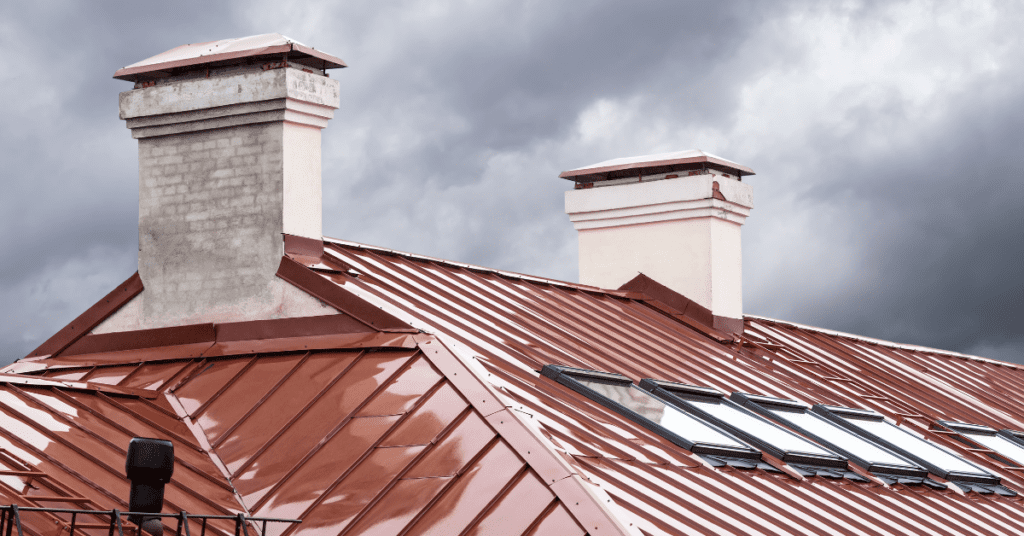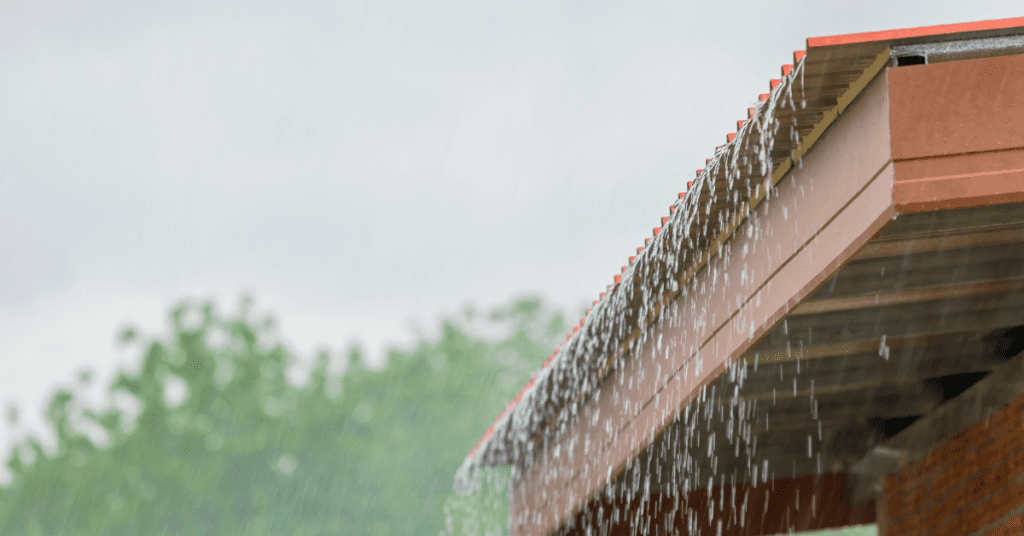Actually, Are Metal Roofs Noisy, Especially In The Rain?


One of the most frequently asked questions about metal roofing is whether these systems create excessive noise during rainfall. This concern stems from outdated perceptions and experiences with older metal roof installations. No, metal roofs are not loud in the rain when properly installed with modern techniques and materials.
The reality is that today’s metal roofing systems, when installed correctly over a complete roof assembly, produce noise levels comparable to traditional asphalt shingles. Understanding the factors that influence noise levels and the available solutions can help homeowners make informed decisions about metal roofing.


Factors Influencing Noise Levels
Several key factors determine how much noise a metal roof produces during precipitation. These elements work together to either amplify or dampen sound transmission.
Type of Metal
Each metal type (aluminum, steel, copper, etc.) has different properties that impact how loud rain sounds. The material composition significantly affects acoustic performance:
- Copper and Zinc: Metals like copper and zinc are denser, heavier, and less resonant, which helps them absorb sound better than the other two
- Aluminum: Aluminum is lighter, thinner, and more prone to vibration than other metals, which makes it the loudest option
- Steel: Steel is quite effective at dampening noise because it’s thicker and denser than other metal roofing materials
Panel thickness also plays a crucial role. Thicker panels are more muted and absorb sound better than thinner panels, making them preferable for noise reduction.
Installation and Insulation
Proper installation is perhaps the most critical factor in noise reduction. Proper installation and insulation can greatly reduce the noise levels of metal roofs it is also particularly useful when it’s time to deal with emergency roofing repairs during winter. Poorly installed roofs or those without sufficient insulation can indeed be noisy.
Modern metal roofing systems benefit from complete roof assemblies that include:
- A roof deck, insulation and underlayment. This considerably dampens the sound of rainfall on the roof
- Solid wood (decking) between the metal panels and your ceiling dulls the noise, but not completely
- Underlayment (high heat ice and water shield) will also be installed over your roof decking before installing the metal roof. This added layer not only protects against leaks but also helps absorb some sound
Weather Conditions
Rain, hail, and wind can cause noise on metal roofs. Different weather conditions produce varying noise levels on metal roofs. A light rain has been described as sounding like soft tapping/popping or leaves rustling, which some homeowners find soothing. However, intensity matters:
- Light rain: Soft tapping sounds
- Normal rain shower: It’ll sound more like little beads hitting a hard surface
- Heavy rain: A continuous echo throughout your home that sounds like a muffled drum roll
Speaking of wind, you might want to check out our article on common misconceptions about wind damage on roofs to broaden your understanding of how weather can affect your roof.


How Loud is a Metal Roof Compared to Other Roofing Materials?
Scientific measurements provide concrete data about metal roof noise levels. According to the Acoustic Group at the University of Lulea, Sweden, rain on asphalt shingles is about 46 dBA compared to rain on a metal roof at 52 dBA.
To put these numbers in perspective:
- A whisper is approximately 30 dBA, rainfall is about 50 dBA, normal conversation is 60 dBA
- A metal roof installed over a complete roof assembly is about 52 dBA. A metal roof installed over open framing, such as on a barn or shed, is around 61 dBA in the rain
The key finding is that since most humans can’t tell the difference between sounds that are less than 8 decibels apart, the noise difference between a metal roof and an asphalt shingle roof is undetectable.
However, it’s important to note that with a complete roof assembly in place, the noise from rain on a metal roof is similar to any other roofing material. The 6-decibel difference becomes negligible in real-world conditions.
Where Does the Idea of a Noisy Metal Roof Come From?
The perception of noisy metal roofs has historical roots. The idea that metal roofs are noisy comes from those open frame barn roofs. For a long time, metal was primarily used for roofs in rural, agricultural settings.
Metal roofs are quite durable, so for these buildings that were not inhabited daily, like barns, the noise trade-off was totally worth it. Unfortunately, that noise reverberated across the country, creating a negative perception of metal roofs that lasts to this day, despite major leaps that have been made within the industry.
Why Are They Better Now?
Modern metal roofing systems have evolved significantly from their agricultural predecessors. No longer are they a sheet of metal nailed to a stud or frame. Today’s metal roofing systems are not open frame.
Contemporary installations include:
- Most houses have a plywood or oriented strand board (OSB) roof deck that roofing materials are attached to, including shingles and metal. In the case of metal, the decking would help deaden the noise of rain
- Most metal roofing systems are also installed over some kind of underlayment, whether it be an extra layer of insulation between the panels and decking, or the pre-existing shingles that the metal was installed over
All of these newer innovations and methods work in tandem to reduce the noise created by rain on a metal roof. It won’t be completely silent, but it will be much closer to the noise experienced by an asphalt shingle roof.
Myths and Facts about Metal Roofs
Understanding the truth behind common misconceptions helps homeowners make informed decisions about metal roofing.
While it’s true that metal roofs can be louder in the rain compared to other roofing materials, the difference is usually minimal and often unnoticeable, especially with proper insulation.
Contrary to popular belief, metal roofs do not amplify sound. In fact, with proper installation and insulation, they can even be quieter than other types of roofs.
The key factor in noise reduction is understanding reverberation. A flat, uncoated sheet of metal–like the smooth surface of a drum–has no way to shorten the prolonged sound reflection, known as reverberation. However, a coated and textured metal roof, such as stone-coated metal roofing, will absorb the noise from the rain.
What to Look for in a Metal Roof That is Quiet in the Rain
When selecting a metal roof for noise reduction, focus on specific features that dampen sound transmission.
Preventing sounds from hitting hard, flat surfaces is key to noise reduction from the rain. Look for:
Textured Surfaces: The thicker the coating and the more irregular the surface texture, the more effective a roof is at disrupting and dampening the reverberation of sound waves.
Stone-Coated Options: Stone-coated metal roofing products are peacefully quiet in the rain due to their intricate textures and the sound-absorbing cushion of stone granules. Stone-coated metal roofing has several layers of natural stone granules which, besides being effective for corrosion resistance and increasing tensile strength, also act as an additional noise barrier.
Quality Materials: Choose thicker gauge metals and avoid thin, uncoated sheets that can create drum-like effects.
How to Reduce Noise from Metal Roofs
Several strategies can significantly reduce noise levels from metal roofing systems.
Consider How Different Metal Types Absorb Noise
As discussed earlier, material selection plays a crucial role in noise reduction. Steel offers the best balance of durability and sound dampening, while copper and zinc provide premium noise reduction but at higher costs.
Add a Sound-Reducing Coating to the Metal Panels
There are also coatings you can add to help reduce noise from rain. They typically contain properties and fillers that absorb sound, such as rubberized compounds. Unlike the painted finish applied during manufacturing, these coatings are applied after installation.
Make Sure the Metal Roof is Installed Over Solid Roof Decking
The most important thing you can do to help with the noise is to make sure your roof decking is in great shape. If your metal roof is installed over solid decking, it will be quieter when it rains.
Proper decking installation ensures that sound has a solid barrier to travel through rather than resonating through open spaces.
Add Insulation Boards Over the Decking
For maximum noise reduction, consider additional insulation. If a homeowner is worried about the noise, I always recommend installing wood fiber insulation boards between the roof decking and metal panels. Adding these boards provides another layer sound has to travel through.
Combined with solid roof decking and your ceiling’s insulation, insulation boards will reduce rain noise quite a bit. While this upgrade increases installation costs, it provides excellent noise reduction along with improved energy efficiency.


Conclusion
So, are metal roofs noisy? The short answer is: not really. While certain factors can contribute to noise, with the right materials and proper installation, comparable to what we recommend in our article on the qualities to look for in good asphalt shingle roofing, metal roofs do not have to be noisier than any other type of roof.
We hope this article has answered your questions and alleviated any concerns about the noise levels of metal roofs. If you’re considering a metal roof for your home or business in any of our service areas, we’re here to help.
Our team of experts is ready to assist you with your roofing needs. From installation to insulation, we provide high-quality services to ensure your metal roof is as quiet and efficient as possible. Don’t let noise concerns deter you from choosing a durable, sustainable, and attractive metal roof. Contact us today to learn more about our services or to schedule a consultation.
Check out some of our metal roofing past projects:
- Burnaby Metal Roof Replacement, Repair and Installation
- Coquitlam Metal Roof Replacement, Repair and Installation
- Delta Metal Roof Replacement, Repair and Installation
- Ladner Metal Roof Replacement, Repair and Installation
- Langley Metal Roof Replacement, Repair and Installation
- Maple Ridge Metal Roof Replacement, Repair and Installation
- New Westminster Metal Roof Replacement, Repair and Installation
- North Vancouver Metal Roof Replacement, Repair and Installation
- Pitt Meadows Metal Roof Replacement, Repair and Installation
- Port Coquitlam Metal Roof Replacement, Repair and Installation
- Port Moody Metal Roof Replacement, Repair and Installation
- Richmond Metal Roof Replacement, Repair and Installation
- Surrey Metal Roof Replacement, Repair and Installation
- White Rock Metal Roof Replacement, Repair and Installation
- West Vancouver Metal Roof Replacement, Repair and Installation
- Vancouver Metal Roof Replacement, Repair and Installation
